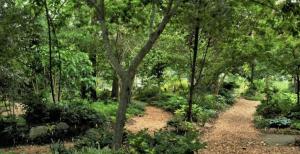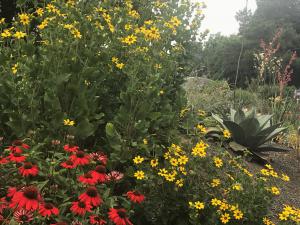Gardening Booms in 2020 – An interview with Tony Avent, Juniper Level Botanic Garden
Juniper Level Botanic Garden, a gift to NC State University, will open for public viewing two weekends this summer: July 10-12 and July 17-19.
RALEIGH, NC, USA, June 23, 2020 /EINPresswire.com/ -- “Gardening is booming in all parts of the country, and nurseries have struggled to keep up with the unprecedented and unexpected demand,” said global plantsman, Tony Avent, founder and proprietor of Juniper Level Botanic Garden and Plant Delights Nursery in Raleigh.
“Gardening is a huge pastime in America, but no one was prepared for this. Nurseries are propagating as fast as they can and shipping as quickly as they can. People have reconnected with the earth, and every plant that goes into the ground pulls carbon dioxide out of the atmosphere. That’s undoubtedly a good thing.
“I believe the bulk of the boom is coming from existing gardeners. However, at our open houses, we see a tremendous number of younger people, generations X, Y, and Z. They’re interested in connecting to nature and having a garden experience in a different way than their parents or grandparents, who were all about better living through chemicals. They’re learning to be more a part of nature, to garden more sustainably.
“Summer is an incredible time in the garden. At our open house, you’ll see a range of plants you’ve never seen. Many plants don’t emerge until mid-June, early July. People who don’t see the gardens in summer miss so many things. They miss many of our great native perennials in the Aster family – so many beautiful gold flowers.
“All the tropical-looking plants are at their peak in the summer months; the cannas, the elephant ears, so many of the aroids [love lilies], and all kinds of crazy things. These are at their peak in the garden, so we see a peak in sales of tropical-looking plants in the summer.
“Pollinators are also more active in the summer months; all the bees, the native bees, the honeybees, and the amazing wasps. Wasps are actually predators of many beetles, so you want them in your garden. Some gardeners are caught up in spraying every time they see an insect, but there are naturally balanced systems in place to take care of pests as long as your plants aren’t stressed. If you provide a sustainable environment, there is balance. When a pest arrives, another insect will take it out. The birds also dine on many problematic insects.
“Nature is fascinating, and there is no more active time than summer. Everything is fully at work. We invite you to bring your children to our open houses and teach your children; or, let us help you teach them. We have a full-time entomologist on staff to teach people about insects and how insects work in the garden. Maybe we can get away from the concept that bugs are bad – they are critical to our life and nature.
“In the summer, you’ll find a 25 to 30-degree difference just walking through sections of Juniper Level Botanic Garden. A garden is like a house. It has walls. It has ceilings. It has the floor. It has furniture, and it has decorations. But we often don’t think of the outside of our house like we do the inside. So, when you walk outside, if you have a ceiling, the trees, it's going to be much cooler in there. Some plants love that baking sun, other plants like to have the filtered light of the tree canopy.
“Many people also think you cannot plant in the summer, which is simply not true. The establishment time for a plant is so much faster in the summer months, and the watering time for new plants is much shorter. If you plant in the winter, you can get by with infrequent waterings, but if you plant in summer, you need to water every day. But the tradeoff is that you only have to water for a week or so before the plant is fully established.
“Gardening is about diversity. Hopefully, we’ve learned that we, as a society, are better with diversity. Gardens are the same way; we want everyone to have an incredibly diverse garden. That way, the garden has something for all the pollinators and something for every season for people to enjoy. That’s what we hope to show people when they come to visit.
“It’s also important for human society to share plants; it’s critical that we not allow plants to go extinct. The rarer a plant is, the more it should be shared. We believe in getting plants where they will thrive and become abundant.
“We’ve joined forces with NC State University and JC Raulston Arboretum because we have the same mission. Secure the plants, study the plants, propagate the plants, and share the plants. It’s so important to our society. Every plant has a place, and every plant has a purpose,” said Tony Avent.
Juniper Level Botanic Garden in Raleigh is a $7.5-million gift to North Carolina State University from Tony and Anita Avent. To contribute to the university’s endowment fund to maintain and open the garden year-round and in perpetuity for the public, click here.
Fundraising efforts for Juniper Level Botanic Garden in conjunction with JC Raulston Arboretum, operate under the auspices of The Endowment Fund of NC State University, a 501(c)3 non-profit, tax ID 56-6000756. Donors will receive an official receipt for contributions to the fund.
Click here for Open Garden Days
Click here for photos and press materials
Contact:
Chris Hardison
Media Contact
Juniper Level Botanic Garden
ChrisHardison@PlantDelights.com
Robert B Butler
Communications | PR
www.NCPressRelease.org
www.RBButler.com
Permission granted for redistribution
Tony Avent was interviewed by Robert B Butler – No attribution required
#NCStateUniversity #JuniperLevelBotanicGarden #JCRaulstonArboretum #NCSU #JLBG #JCRA #OpenGardenDays #BotanicGarden #PlantDelightsNursery #PublicGarden #Arboretum #COVID19 #Pandemic #Ornamentals #TonyAvent #MarkWeathington #AnitaAvent
Robert B Butler
North Carolina Press Release
+1 919-455-8345
email us here
Legal Disclaimer:
EIN Presswire provides this news content "as is" without warranty of any kind. We do not accept any responsibility or liability for the accuracy, content, images, videos, licenses, completeness, legality, or reliability of the information contained in this article. If you have any complaints or copyright issues related to this article, kindly contact the author above.


